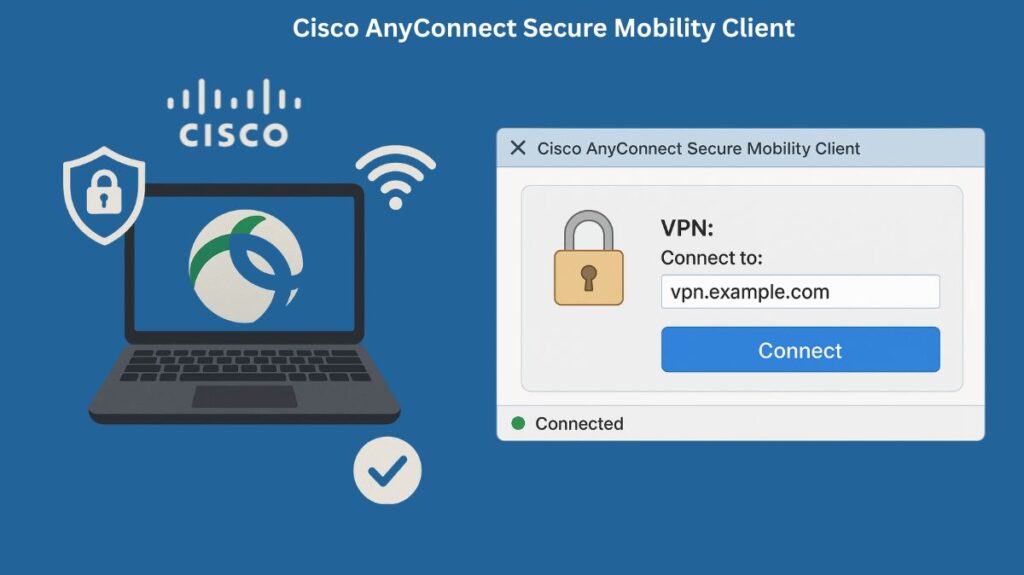What is the Cisco AnyConnect Secure Mobility Client?

Designed as client software for user devices to create a Virtual Private Network (VPN) connection, the Cisco AnyConnect Secure Mobility Client is a secure remote access VPN. It is frequently called the Cisco VPN client.
The AnyConnect Client is essential to the implementation of remote-access VPNs (client VPNs) because its main function is to allow individual hosts, such as telecommuters or mobile users, to safely access a company network via the Internet.
It is significant to remember that with Version 5, the product was renamed Cisco Secure Client.
You can also read What is WPA2 Enterprise, Core Architecture and Configuration
Operation and Protocol Usage
By establishing a safe, encrypted connection (or tunnel) to the company network, the AnyConnect Client operates. This connection enables persistent access to business applications and resources as if the user were on the local network.
- Protocols: To create the VPN remote-access tunnel, the client mostly employs the Transport Layer Security (TLS) protocol. Both IPsec and SSL VPNs are supported. TLS is regarded as the Secure Sockets Layer’s (SSL) more recent iteration.
- Full-Tunnel Encryption: A full-tunnel SSL VPN is the usual term used to describe the implementation. All packets sent to the other end of the tunnel are encrypted as a result of using the TLS tunnel. All device traffic is encrypted, guaranteeing that the client device can access any application on the company network.
- IP Addressing: In full-tunnel mode, a pre-configured IP address pool is used to assign each connecting client a unique virtual IP address.
- Tunnel Options: Split tunneling, which AnyConnect provides, enables traffic intended for business networks to pass through the VPN tunnel while regular internet traffic is routed normally, outside the tunnel. However, as it forces all traffic to go through corporate security mechanisms, turning off split tunneling is frequently thought to be more secure.
- VPN Gateway: A firewall, such as the Cisco Adaptive Security Appliance (ASA), is frequently the VPN gateway at the enterprise site, which is the other end of the TLS connection.
Security and Key Features
To safeguard access, the AnyConnect client has a number of security features:
- Multi-factor authentication (MFA): This protects VPN access by confirming user identification. An Authentication, Authorization, and Accounting (AAA) server, like a Cisco Access Control Server (ACS) or Identity Services Engine (ISE), is usually used to authenticate users. RADIUS is frequently used in these servers.
- Endpoint posture assessment: Before allowing a user’s device to connect to the network, this feature makes sure it satisfies all security criteria, such as having up-to-date antivirus software.
- Modular Design: The client’s design allows for the addition of extra security modules for a range of purposes, including endpoint analytics and threat prevention.
You can also read What Is A WPA2 PSK Key? And How Does WPA2 PSK Work?
Deployment and Compatibility
- Cross-platform Support: The client is compatible with Windows, Mac OS, Linux, and mobile platforms such as iOS and Android.
- Licensing: The program needs a current license, which is usually included in a Cisco headend license (such as VPN Only, Plus, or Apex).
- Acquisition: After entering their work credentials, users usually download the client from a portal supplied by the company.
- Installation Method: Before launching the AnyConnect client, administrators frequently configure a clientless SSL VPN (Web VPN). The server asks users to authenticate when they connect using a browser, after which it dynamically downloads and installs the complete AnyConnect client software. The ASA normally stores a copy of the client software package on its flash memory for deployment.
You can also read What Is WPA Shared Key? Advantages of Shared key In Network
